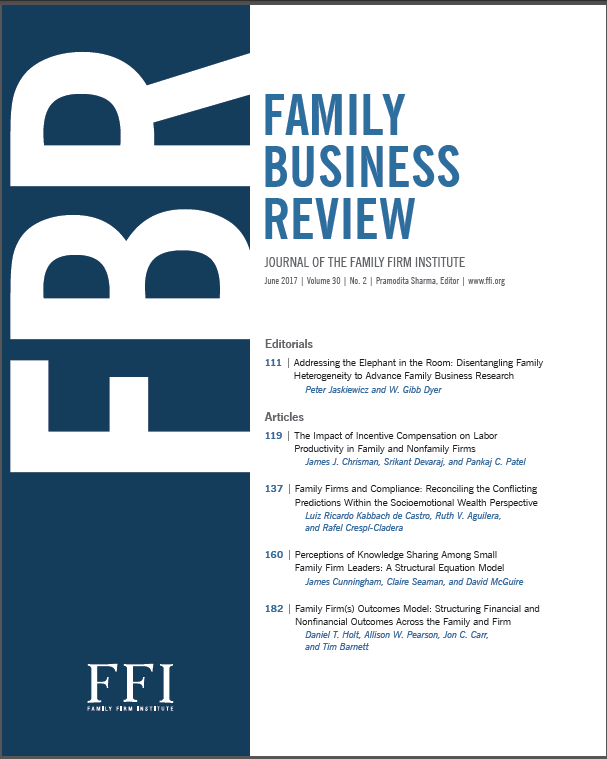Call for Papers for the 2023 Family Business Review (FBR) Special Issue on History-informed Family Business Research
IF 5.6
1区 管理学
Q1 BUSINESS
引用次数: 2
Abstract
History is pervasive in family business settings, where values, beliefs, narratives, and artefacts of the founding family are handed down from generation to generation (Colli, 2003). The history of a family and its business therefore pervades family business goals, practices, and outcomes, creating a close link between the history of family businesses, their present traditions, and future aspirations (De Massis et al., 2016; Jaskiewicz et al., 2015; Zellweger et al., 2012). Because of the prominence of history in family businesses, these firms have often been stigmatized as a form of business organization that is steadfast to its history and traditions, path dependent, conservative, resistant to changes and unable to adapt to dynamic and constantly evolving markets (Chandler, 1977; Morck & Yeung, 2003; Poza et al., 1997). Yet, family businesses remain dominant in any economy (La Porta et al., 1999), many of them are highly innovative (De Massis et al., 2018), resilient to crises, and equipped with the stamina to pursue entrepreneurial projects over generations (Jaskiewicz et al., 2016; Sinha, Jaskiewicz, Gibb, & Combs, 2020). The latter is consistent with emerging research suggesting that the history and traditions of families and their businesses do not have to be a rigid burden but, in some cases, can be a holy grail for enduring innovation and change (Erdogan et al., 2020; Jaskiewicz, Combs, & Ketchen, 2016; Suddaby & Jaskiewicz, 2020). While researchers thus recognize the paradoxical nature of the family business as an organization that can be burdened or empowered by history, theory on how history actually ties into family business’ tradition, change, and aspiration remains scarce (De Massis, Frattini, Kotlar, Messeni Petruzzelli, & Wright, 2016; Erdogan et al., 2020; Sinha et al., 2020; Suddaby, Coraiola, Harvey, & Foster, 2020; Suddaby & Jaskiewicz, 2020). One reason for this unsatisfactory status quo is the weak connection between history and family business scholarship that has limited current understanding of what family business scholars can learn from the wealth of history and historical research, and how they can integrate related learnings in the study of family business (e.g., Colli, 2003; Colli & Fernandez Perez, 2020). Considering the rapidly growing interest in studying the link between history and family businesses, we believe that it is warranted and timely to build a strong foundation for a history-informed approach to the study of family businesses, by which we refer to family business research that draws on historical research methods and/or leverages history as a key component (or variable) of theory or empirical analysis (Argyres et al., 2020; Sasaki et al., 2020; Sinha et al., 2020; Suddaby & Foster, 2017; Suddaby et al., 2020). 945053 FBRXXX10.1177/0894486520945053Family Business Review research-article20202023年家族企业评论(FBR)历史家族企业研究特刊论文征集
历史在家族企业环境中无处不在,创始家族的价值观、信仰、叙事和手工艺品代代相传(Colli,2003)。因此,家族及其企业的历史贯穿于家族企业的目标、实践和结果,在家族企业的历史、当前传统和未来愿望之间建立了紧密的联系(De Massis等人,2016;Jaskiewicz等人,2015;Zellweger等人,2012)。由于历史在家族企业中的突出地位,这些公司经常被污名化为一种商业组织形式,它坚持其历史和传统,依赖路径,保守,抗拒变化,无法适应动态和不断发展的市场(Chandler,1977;Morck&Yeung,2003年;Poza等人,1997年)。然而,家族企业在任何经济体中仍然占主导地位(La Porta et al.,1999),其中许多都具有高度创新性(De Massis et al.,2018),能够抵御危机,并具备几代人追求创业项目的毅力(Jaskiewicz et al.,2016;Sinha、Jaskiewich、Gibb和Combs,2020)。后者与新兴研究一致,这些研究表明,家庭及其企业的历史和传统不一定是一种刚性负担,但在某些情况下,可以成为持久创新和变革的圣杯(Erdogan et al.,2020;Jaskiewicz、Combs和Ketchen,2016;Suddaby和Jaskiewich,2020)。因此,尽管研究人员认识到家族企业作为一个可以被历史负担或赋予权力的组织的矛盾性质,但关于历史如何与家族企业传统实际联系的理论发生了变化,愿望仍然匮乏(De Massis,Frattini,Kotlar,Messeni-Petruzzelli,&Wright,2016;埃尔多安等人,2020;Sinha等人,2020年;Suddaby,Coraiola,Harvey,&Foster,2020;Suddaby&Jaskiewicz,2020)。这种不令人满意的现状的一个原因是历史和家族企业学术之间的联系薄弱,目前对家族企业学者可以从丰富的历史和历史研究中学习到什么,以及他们如何将相关知识整合到家族企业研究中的理解有限(例如,Colli,2003;Colli和Fernandez-Perez,2020)。考虑到人们对研究历史与家族企业之间联系的兴趣迅速增长,我们认为,为家族企业的历史研究方法奠定坚实的基础是有必要和及时的,我们指的是利用历史研究方法和/或利用历史作为理论或实证分析的关键组成部分(或变量)的家族企业研究(Argyres等人,2020;Sasaki等人,2020年;Sinha等人,2020,Suddaby&Foster,2017;Suddaby等人,2020)。945053 FBRXXX10.1177/0894486520945053家族企业评论研究-文章2020
本文章由计算机程序翻译,如有差异,请以英文原文为准。
求助全文
约1分钟内获得全文
求助全文
来源期刊

Family Business Review
BUSINESS-
CiteScore
12.40
自引率
13.60%
发文量
13
期刊介绍:
Family Business Review (FBR) has been a refereed journal since 1988, serving as the premier scholarly publication dedicated to the study of family-controlled enterprises. It delves into the dynamics of these businesses, encompassing a range of sizes from small to very large. FBR concentrates not only on the entrepreneurial founding generation but also on family enterprises in subsequent generations, including some of the world's oldest companies. The journal also publishes interdisciplinary research covering families of wealth, family foundations, and offices.
 求助内容:
求助内容: 应助结果提醒方式:
应助结果提醒方式:


